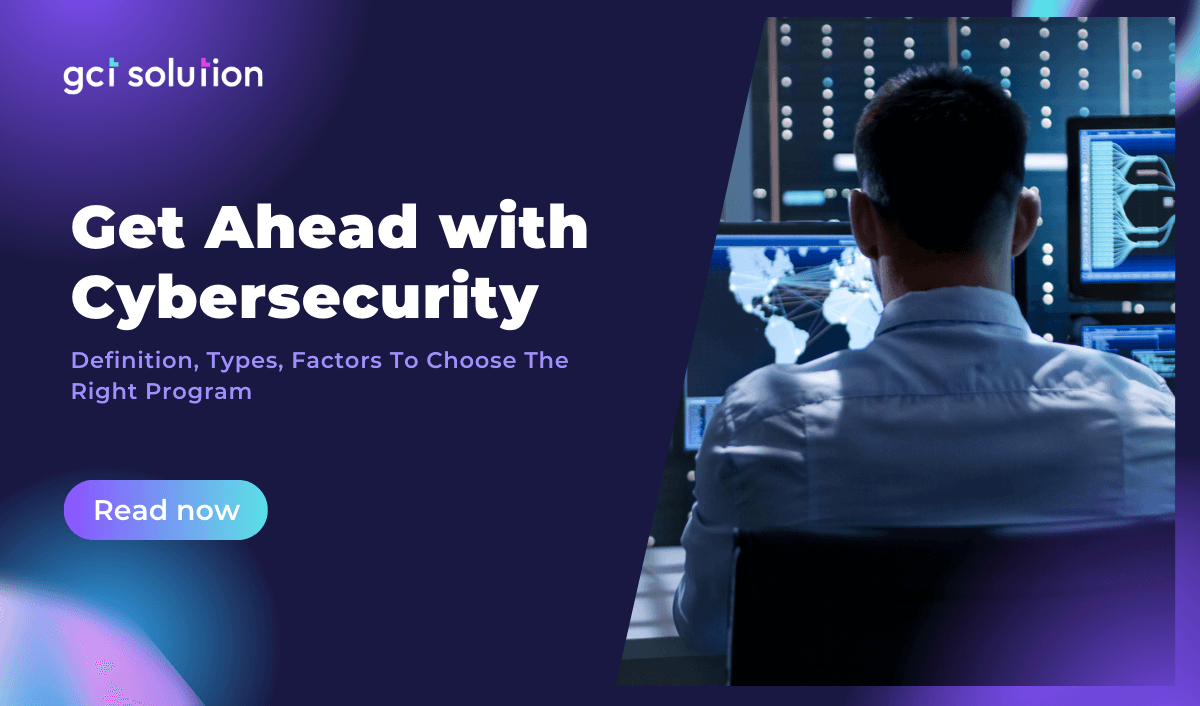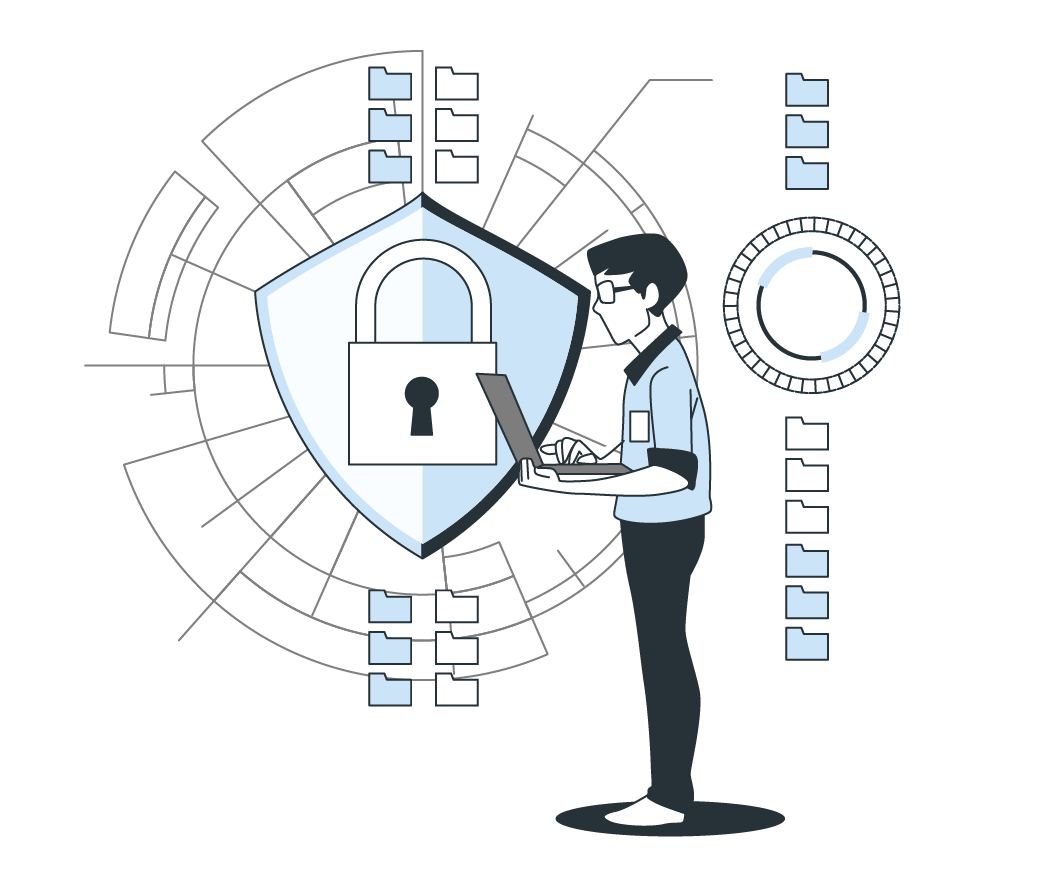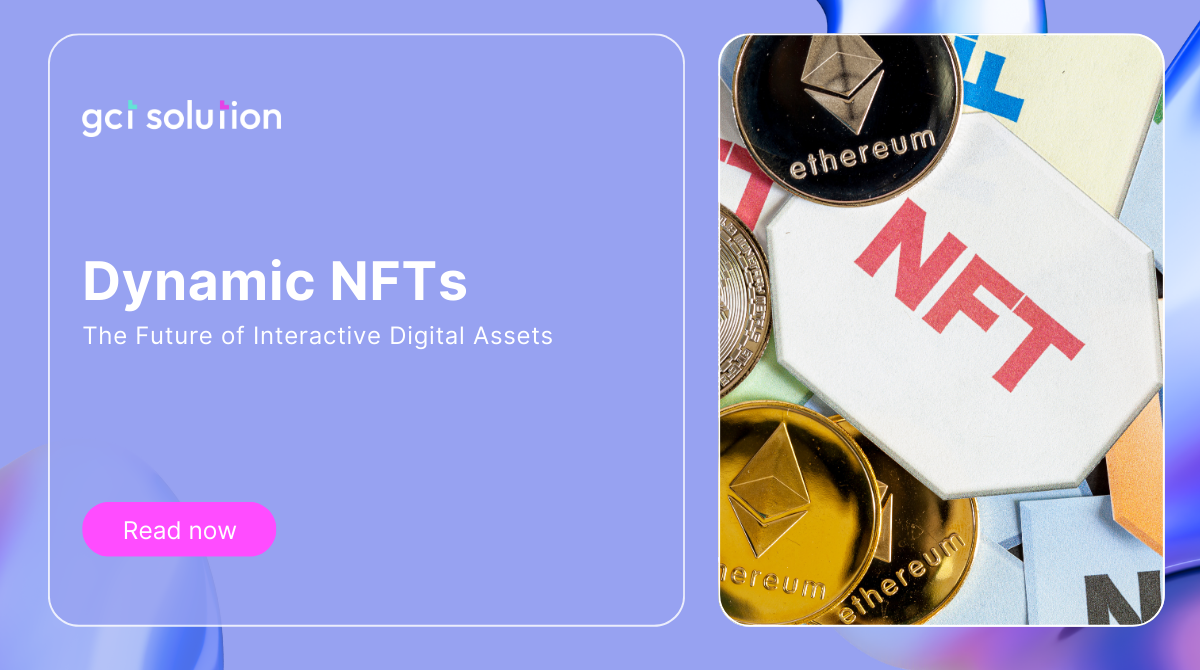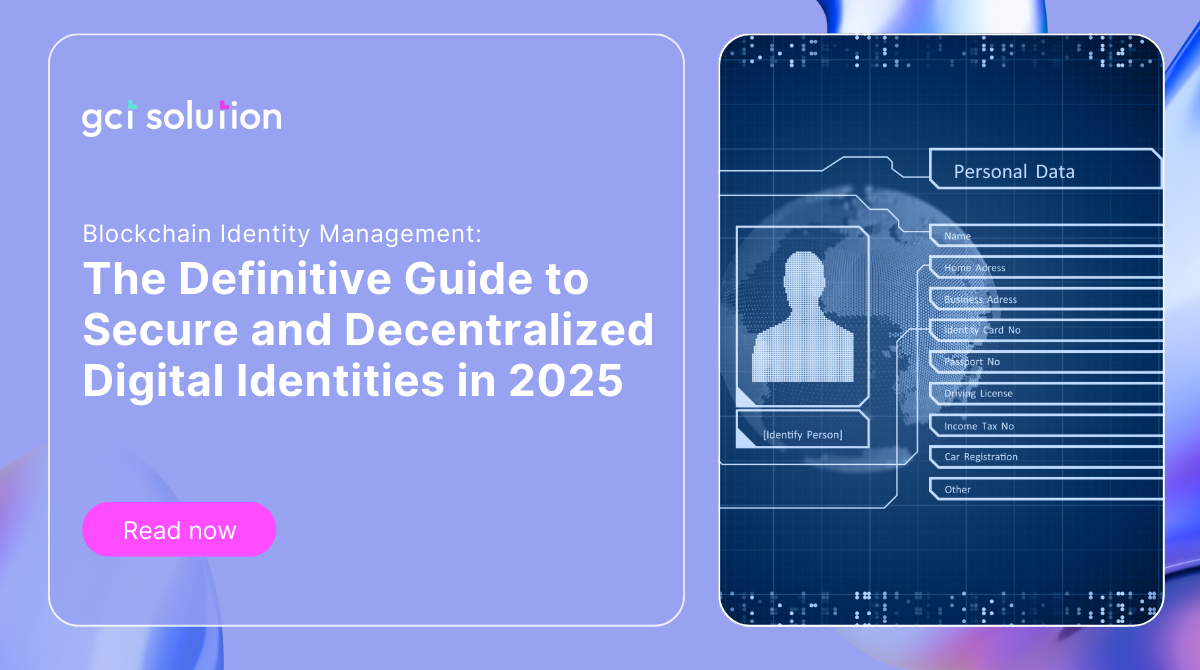As the world becomes increasingly interconnected, businesses, especially small to medium-sized ones, are finding themselves in the crosshairs of malicious hackers. According to Security Intelligence, there were a staggering 11,395 reported phishing attacks in Europe in the first half of 2022 alone, costing businesses a whopping $12.3 million. It's a dog-eat-dog world out there, and cybercriminals are always on the lookout for their next prey. So, how can businesses get ahead in this cat-and-mouse game? The answer lies in investing in robust cybersecurity programs that can fend off these digital predators. In this article, GCT Solution will take a deep dive into the world of cybersecurity programs, exploring their definitions, and types, and offering valuable insights into the factors that businesses should consider when choosing the right program to protect themselves from threats to cybersecurity.
Get Ahead with Cybersecurity Programs - Definition, Types, and Factors to Consider to Choose The Right Program
I. What are cybersecurity programs?
Cybersecurity programs are software or tools designed to protect computer systems, networks, and data from unauthorized access, theft, or damage. In today's digital age, cybersecurity is more important than ever, and SMEs are not immune to threats to cybersecurity. In fact, they can be more vulnerable than larger organizations due to limited resources and smaller IT departments. A successful cyberattack can have significant consequences, including financial loss, reputational damage, and loss of customer trust.
II. Different Types of Cybersecurity Programs
Now that we understand the importance of cybersecurity programs, let's take a closer look at the different types of cybersecurity programs that SMEs can use to protect their businesses.
1. Antivirus Software
Antivirus software is one of the most well-known types of cybersecurity programs. It works by scanning a computer or network for viruses, malware, and other malicious programs, and then removes them from the system. According to a report by Statista, the global antivirus software market was valued at $5.9 billion in 2020 and is projected to reach $8.5 billion by 2026. Popular antivirus software includes Norton, Bitdefender, and Avast.
.png)
2. Firewalls
Firewalls are designed to monitor and control incoming and outgoing network traffic based on predetermined security rules. They can be software-based or hardware-based and are essential for protecting networks from unauthorized access. According to a study by MarketsandMarkets, the global firewall market is forecasted to reach $10.5 billion by 2023. Popular firewall solutions include Cisco, SonicWall, and Juniper Networks.
.png)
3. Intrusion Detection and Prevention Systems
Intrusion Detection and Prevention Systems (IDPS) are designed to detect and prevent unauthorized access to computer systems or networks. IDPS solutions monitor network traffic and can identify and respond to potential security threats in real time. According to a report by ResearchAndMarkets, the global IDPS market is expected to reach $5.5 billion by 2025. Popular IDPS solutions include Snort, Bro, and Suricata.
.png)
4. Encryption Software
Encryption software is used to protect sensitive data by converting it into unreadable code that can only be deciphered with a key. This type of cybersecurity program is particularly important for businesses that handle sensitive information, such as financial institutions and healthcare providers. According to a report by MarketsandMarkets, the global encryption software market is expected to reach $16.5 billion by 2025. Popular encryption software solutions include VeraCrypt, BitLocker, and AESCrypt.
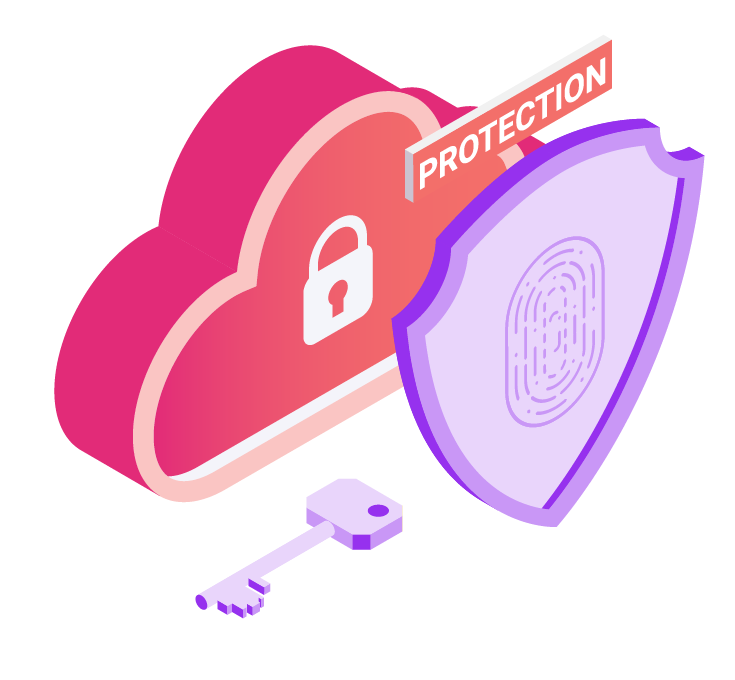
5. Vulnerability Scanning Software
Vulnerability scanning software is used to identify weaknesses in computer systems or networks that could be exploited by cybercriminals. These programs scan networks and systems for vulnerabilities and provide recommendations for remediation. According to a report by MarketsandMarkets, the global vulnerability assessment market is projected to reach $13.8 billion by 2025. Popular vulnerability scanning software solutions include Nessus, OpenVAS, and Qualys.
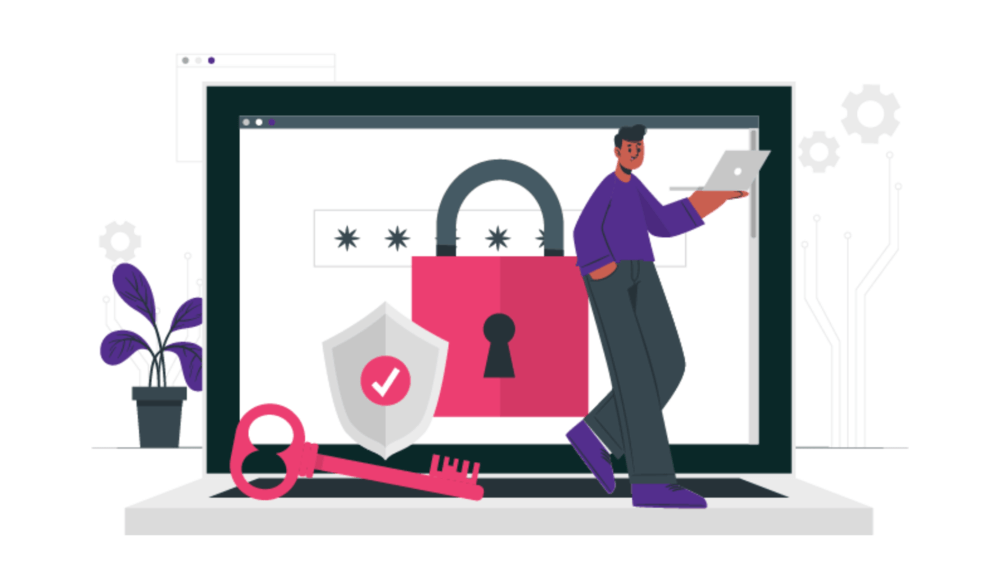
III. Factors to Consider When Choosing a Cybersecurity Program
When choosing a cybersecurity program for your SME, there are several factors to consider. Here are some of the most important:
Budget: How much can you afford to spend on cybersecurity programs? Some programs can be expensive, so it's important to set a budget before making a decision. For example, if you want to find a cost-effective solution without compromising quality, you can consider open-source cybersecurity solutions.
Business Size and Type: Different businesses have different cybersecurity needs, depending on their size and the type of data they handle. Smaller businesses may not require the same level of cybersecurity as larger organizations that handle more sensitive data. For instance, a healthcare business will require a more robust cybersecurity program compared to a retail store.
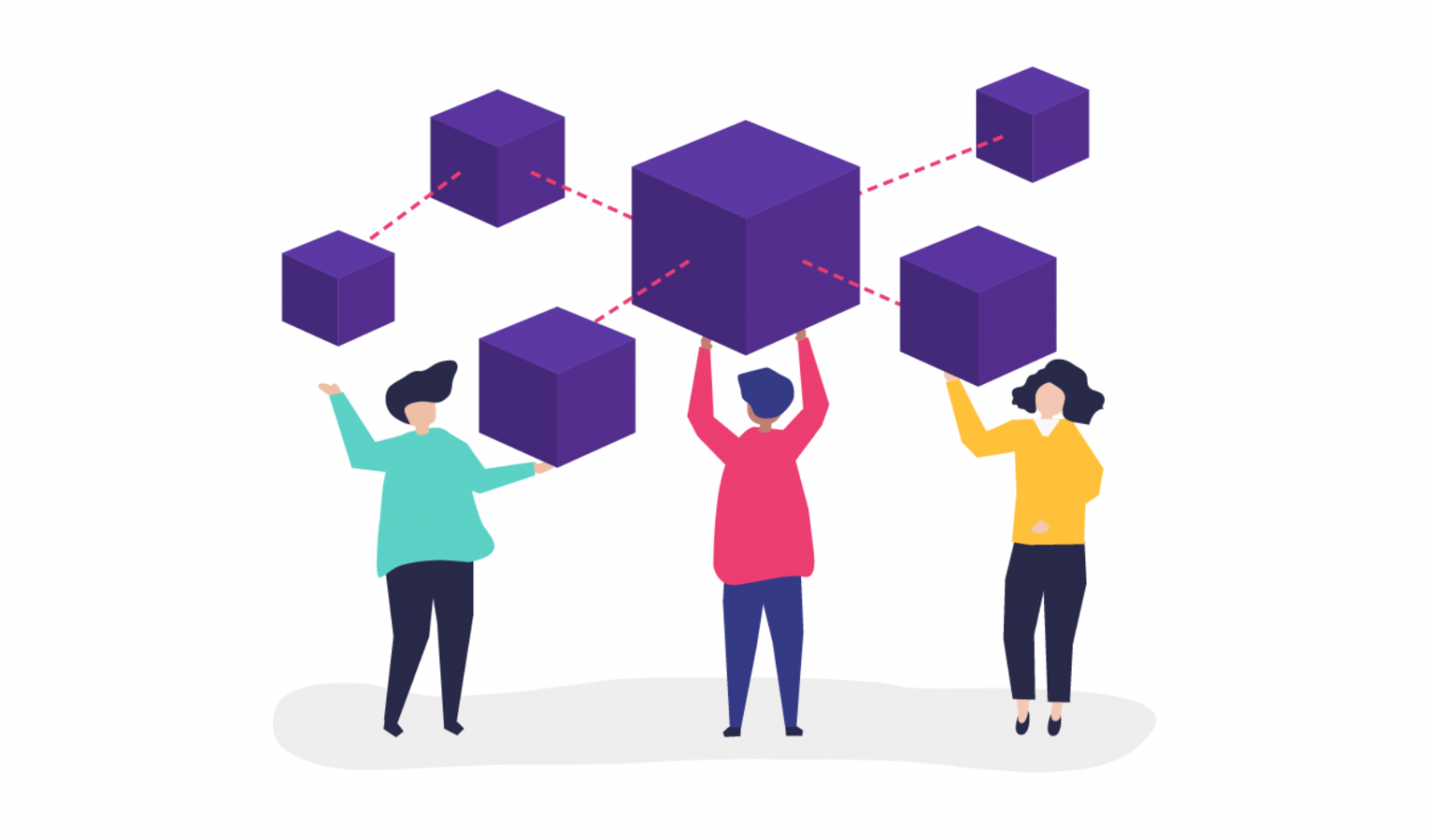
Compliance Requirements: Depending on your industry, you may be required to comply with certain regulations related to data privacy and security. For example, the General Data Protection Regulation (GDPR) requires businesses to comply with strict data protection regulations. Failure to comply can lead to hefty fines and legal action. Thus, a business in the EU will need to select a program that meets GDPR compliance standards.
Threat Landscape: What types of threats to cybersecurity are you most likely to face? Understanding the threat landscape is essential for selecting the right cybersecurity program. Cyber threats are continually evolving, and businesses need to be aware of the risks they face. For example, a business that deals with financial data will face different threats to cybersecurity than a business that handles customer contact information.
User-Friendliness: How easy is the program to use and maintain? Some programs require extensive training, while others are designed to be user-friendly. Some programs require extensive training and can be difficult to maintain, which may not be feasible for smaller businesses with limited resources. In contrast, some programs are designed to be user-friendly and require minimal training to use. An example of a user-friendly program is Webroot, which is known for its ease of use and low system impact.

Final thoughts
It's crystal clear that businesses, regardless of their size or industry, must prioritize cybersecurity programs to avoid falling prey to cybercriminals. Remember, "prevention is better than cure," and investing in a cybersecurity program is the best way to prevent cyberattacks. By choosing the right program and taking necessary precautions, businesses can be as safe as houses and secure their data from hackers. It's crucial to stay ahead of the curve and keep up with the latest cybersecurity trends and technologies to ensure that businesses' systems and data are always safe and secure. In short, it's better to be safe than sorry and invest in cybersecurity programs today to protect your business from cyber threats tomorrow.
If you are seeking a seasoned IT provider, GCT Solution is the ideal choice. With 3 years of expertise, we specialize in Mobile App , Web App, System Development, Blockchain Development and Testing Services. Our 100+ skilled IT consultants and developers can handle projects of any size. Having successfully delivered over 50+ solutions to clients worldwide, we are dedicated to supporting your goals. Reach out to us for a detailed discussion, confident that GCT Solution is poised to meet all your IT needs with tailored, efficient solutions.

